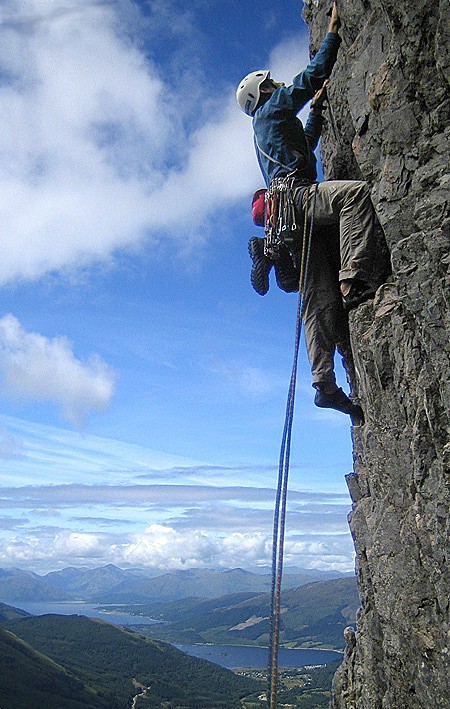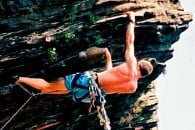
Two of our regular users, Simon Lee and Mark Stevenson have been kind enough to provide us with editorials outlining their experience and beliefs in this field. They have generally opposing views and both bring up important and relevant points.
We at UKC are currently working with the BMC, discussing if, how, and when accidents should be recorded and reported. We hope these editorials add something to those discussions and we are committed to helping promote safety in climbing where it is relevant and useful. When the BMC finalise their policy we will publish the details.
Read Simon Lee's Editorial HERE

The topic of climbing accidents has raised its head once again on UKC so I have put some of my opinions together in this editorial. My main concern is that in the absence of any formalised accident reporting, no-one really knows how dangerous UK rock climbing is or even what the main dangers actually are. However, what unnerves me even more is that many climbers seem content with this state of relative ignorance.
In my previous career, I spent five years as an aircraft engineer, a profession where safety is of paramount importance. For both pilots and engineers, part of your ongoing professional development is to read and digest detailed reports on accidents and dangerous incidents. A culture of reporting 'near misses' as well as just accidents, along with formal training in 'human factors' (the psychology of human errors) enables accidents to be avoided by understanding how and why they are most likely to occur. This approach, pursued across aviation over the course of several decades, has helped make flying safer than driving despite far greater objective risks.
Other high risk sports including sub-aqua diving and parachuting have followed aviation's lead and have well-developed 'safety cultures' that revolve around the investigation of incidents and the wide dissemination of information about them. This also happens with climbing to some extent in the USA but is completely lacking in UK climbing.
Since no information is collected on climbing accidents within the UK, as far as accident prevention is concerned, either as a individual climber or more importantly as an instructor, we operate in a vacuum. Based on overseas reports, fragmentary descriptions of accidents from varying sources, including UKC and anecdotal accounts from fellow climbers I have tried to form an understanding of what may constitute the highest risks within climbing. Others, including many professional climbing instructors, seem happy to rely on their personal perception of risks rather than on any objective information.
I think that accident investigation is crucial to reducing accidents, and hence deaths and injuries in our sport in future years.
There are a number of pertinent points that I wish to address in more detail:
Firstly, accidents are NOT isolated events. The vast majority of accidents occur due to 'unsafe acts' and for serious climbing accidents to occur with a noticeable frequency, these unsafe acts must be happening at a much higher rate. In aviation safety, Heinrich's Ratio is well known; for every serious accident (such as those discussed on UKC), 29 minor accidents and 300 near-misses will have happened. This means that lots of UK climbers are doing dangerous things.
Secondly, again harking back to aviation, in accident investigations there is no such thing as a 'simple mistake'. In every one of the dozens of accident reports I read over the years there were multiple factors involved that led to the adverse outcome. What this means is that even from accidents that some may dismiss as 'basic errors', you can draw multiple conclusions and over time, spot wider trends. These trends may be in terms of rock type, location, route grade, the experience of climbers, nature of the group, time of day, weather, equipment involved or even specific combinations thereof. In climbing there are a variety of risks. These can usually be reduced or mitigated against but only if the requisite level of awareness is present. Without detailed information on ideally hundreds of incidents it is not possible to identify if there are certain combinations of circumstances where that risk awareness is often lacking and are hence particularly dangerous. If these can be identified and the climbers at risk informed, lives could be saved in future – forewarned is forearmed.
Thirdly, climbing is not just about common sense and is extremely complex. I repeatedly see experienced climbers do things that vary from being slightly concerning to very worrying. Often those concerned have made informed (if misguided) decisions, but in lots of cases confusion and ignorance are rife. For any serious accident involving a technical issue, around 300 related near-misses have probably taken place. Therefore widespread failings in technical knowledge may be identified through the analysis of accidents. It would be an over-reaction to launch an information campaign on an issue such as threading lower-offs on sport routes, safe abseiling or preventing runners unzipping ground up, based on a single accident. However if a clear trend is apparent then appropriate action to highlight specific technical competences could be considered. That sort of action could again have a high probability of reducing future injuries or saving lives.
Fourthly, I'll bring in a bit of psychology. As human beings we have a limited capacity both in terms of attention span and in terms of memory and information retention. This means that when it comes to climbing we really can't do everything correct, 100% of the time. Also novice climbers cannot learn everything they might need to know instantaneously. What this means is that we need to focus most on the riskiest elements of climbing. We do this in many ways without thinking about it, double checking knots/harnesses, using standardised climbing calls, using multiple anchors on belays etc. However without knowledge of what it is that actually kills or injures climbers, it is impossible to say that the key risks are being given sufficient attention, both by individual climbers and by instructors.
Finally, there is the privacy issue of whether the actions of an individual should become public currency in the aftermath of an accident. I believe they should.
Many other climbers also share my desire for knowledge about how to avoid future accidents which means that discussion of climbing incidents both online and via the rumour mill is almost inevitable. What is also inevitable is that in any on line debate, some contributors will have less climbing experience and no experience of accident pathology so may be excessively judgemental or opinionated. However, a structured and official approach to accident reporting would eliminate the need for ad-hoc public discussion of incidents since climbers would be confident that the full details would emerge in due course . This would hopefully mean that insensitive public critique of climbers in the immediate aftermath of incidents could be avoided.
Hopefully I've put forward some of my thinking about why I believe the current position of disinterested ignorance by the wider climbing community in correctly evaluating the risks in our sport should change. As mentioned above, some other sports already have methodologies in place for accident and incident reporting that climbing could evaluate and build upon. The establishment of a national accident reporting scheme will not be a complete step into the unknown.
What it might reveal, and what we should do once we have that information, is a debate I hope to be having in the not too distant future.










Comments